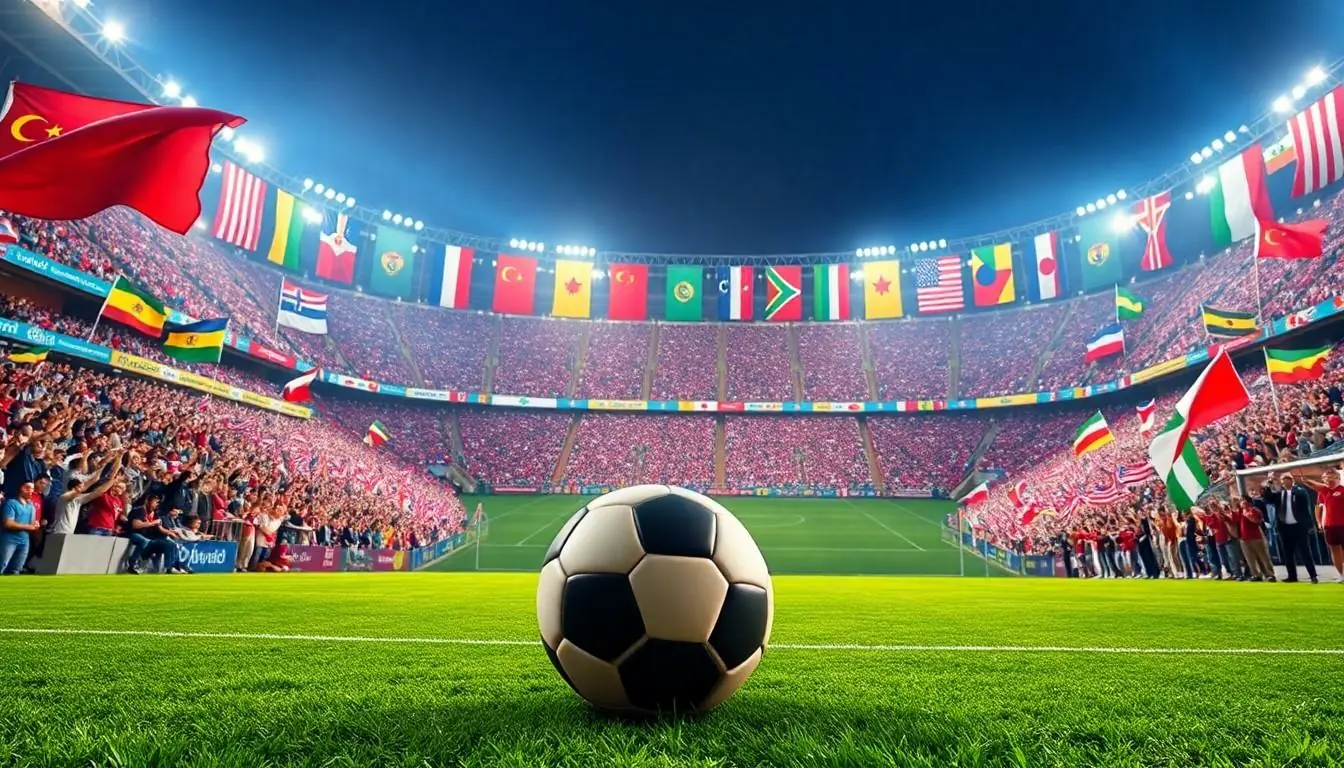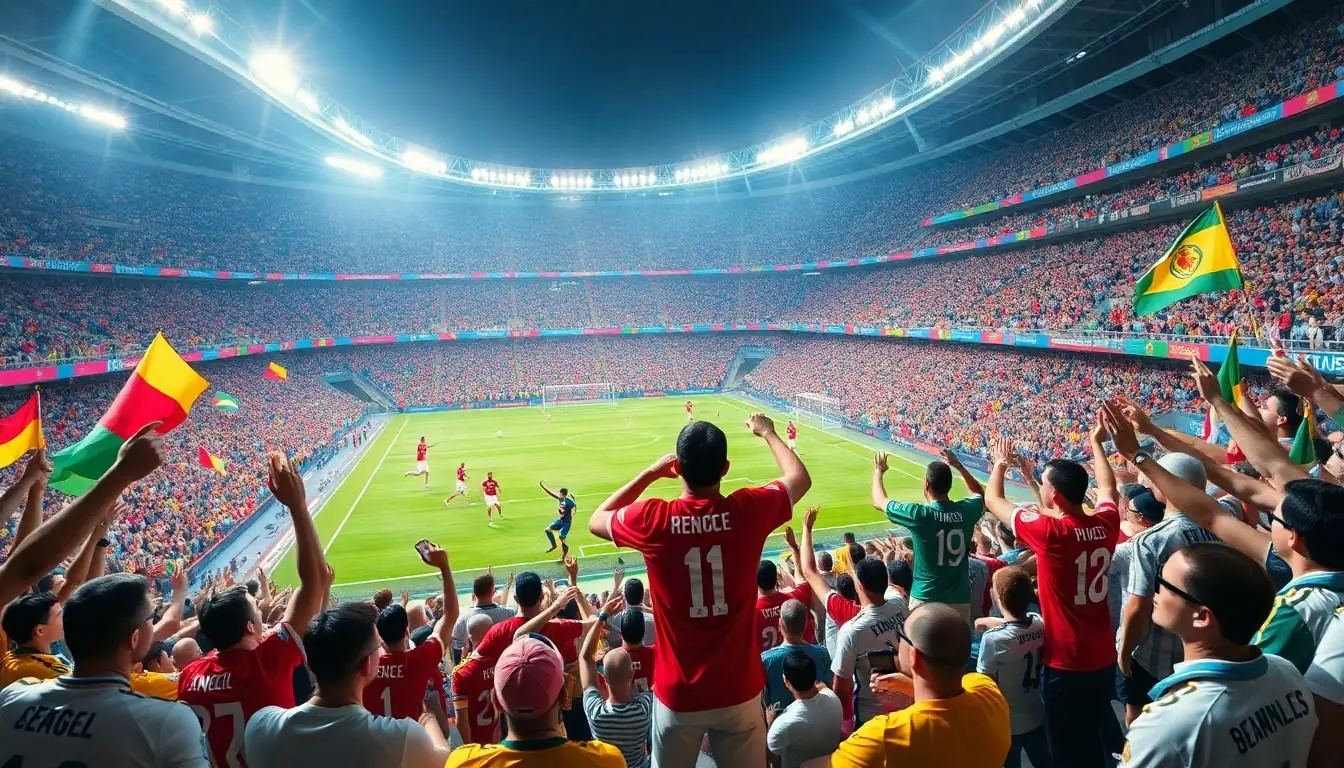Table of Contents
ToggleSoccer fans, grab your jerseys and get ready to reminisce! The last FIFA World Cup was a whirlwind of excitement, drama, and unforgettable moments that had everyone on the edge of their seats. Held in Qatar in 2022, it showcased the world’s best teams battling it out for glory, and let’s be honest, who doesn’t love a good underdog story?
Overview of the FIFA World Cup
The FIFA World Cup stands as the premier international soccer tournament, captivating millions worldwide. Established in 1930, it occurs every four years, showcasing the best national teams in the sport. The 2022 FIFA World Cup, hosted in Qatar, marked the first time the tournament took place in the Arab world. Played from November 20 to December 18, this edition featured 32 teams competing for the coveted trophy.
General excitement surrounds the tournament, driven by the chance for teams to achieve glory on an international stage. In 2022, teams displayed extraordinary talent, with matches full of unpredictable outcomes and thrilling moments. Fans eagerly follow their favorite players and countries, forming a global community united by soccer. Historical rivalries and surprising underdog stories add to the drama of the tournament, enhancing its appeal.
The FIFA World Cup not only fosters national pride but also contributes significantly to host nations’ economies through tourism and infrastructure development. Qatar invested approximately $200 billion in infrastructure to host the event successfully, highlighting the importance of the occasion. The tournament’s global viewership reached over 3.5 billion, illustrating the widespread interest in and significance of this sporting event.
Through captivating narratives and electrifying matches, the FIFA World Cup continues to inspire future generations of soccer players and fans alike. The passion shown for the sport during these four-week events attests to its enduring popularity with audiences across continents.
Historical Context
The FIFA World Cup stands as the pinnacle of international soccer, evolving significantly since its inception. Established in 1930, this tournament has transformed from a modest competition to a global phenomenon, reflecting soccer’s growth in popularity. Every four years, teams vie for the title, with the format adapting to incorporate 32 national teams since 1998. The 2022 edition in Qatar marked a watershed moment as the first World Cup held in the Arab world, blending culture with sport.
Evolution of the Tournament
Changes to the FIFA World Cup structure have shaped its current form. Initially, the competition began with 13 teams in 1930. Over time, expansion included more teams, accommodating a broader range of nations. The introduction of technology, such as VAR (Video Assistant Referee), enhanced decision-making on the field. Each tournament now showcases wild card teams that surprise spectators. Innovations in broadcasting also boost viewership figures, making the event more accessible to fans worldwide.
Notable Previous Editions
Several previous World Cups left indelible marks on soccer history. The 1950 tournament in Brazil featured a legendary match known as the “Maracanazo,” where Uruguay shocked the host nation. In 1966, England claimed its first and only title on home soil, highlighted by Geoff Hurst’s iconic hat-trick in the final. The 1998 event in France introduced 32 teams, paving the way for a more diverse representation in the sport. Both the 2014 edition in Brazil and the 2010 tournament in South Africa also captured global attention, showcasing breathtaking performances and unforgettable moments.
When Was the Last FIFA World Cup
The last FIFA World Cup took place in Qatar from November 20 to December 18, 2022. This event marked a historic moment as it was the first World Cup held in the Arab world.
Date and Location
Qatar hosted the 2022 FIFA World Cup, showcasing its vibrant culture and modern infrastructure. The tournament occurred during the winter months, a first for the World Cup, in response to Qatar’s extreme summer temperatures. Organizers brought together 32 teams, competing in various cities, including Doha and Lusail. This change aimed to enhance player performance and spectator comfort, making the event more enjoyable for everyone.
Key Highlights
The tournament featured a series of unexpected outcomes and thrilling matches, capturing global attention. France, the reigning champion, faced Argentina in a gripping final, which ended in a dramatic penalty shootout. Over 3.5 billion viewers tuned in to experience the excitement. Technological advancements like VAR played a crucial role in enhancing the fairness of the matches. Fans witnessed remarkable performances from emerging players, adding to the rich narrative of soccer’s most prestigious event.
Impact of the Last FIFA World Cup
The last FIFA World Cup in Qatar left a lasting impact on multiple fronts. Engaging fans, it connected diverse cultures through the love of soccer.
Cultural Significance
Cultural connections flourished during the 2022 tournament. Hosting the World Cup showcased Arab culture on a global stage. Traditional Qatari hospitality and local customs captivated millions. Notably, the event featured cultural performances, art installations, and culinary experiences that celebrated regional heritage. Fans from over 200 countries exchanged ideas and traditions, fostering international camaraderie. The unique scheduling in winter allowed for more comfortable experiences, drawing even larger crowds. Showcasing solidarity among nations, it highlighted how soccer can unite different cultures.
Economic Effects
The economic effects of the 2022 World Cup in Qatar proved substantial. Qatar invested approximately $200 billion in infrastructure projects, including stadiums, transportation, and hotels. This massive investment significantly boosted various sectors, creating thousands of jobs. Tourism surged, with approximately 1.5 million visitors arriving for the event, generating immense revenue. Enhanced urban development transformed Qatar into a global sports destination. Additionally, global viewership of over 3.5 billion people stimulated interest in future investments and collaborations. The event’s legacy will influence Qatar’s economy for years to come, positioning it favorably on the international stage.







